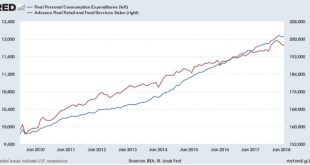This essay is excellent. Just click the link. Kai Stinchcombe argues “blockchain is a … technology, not a metaphor” here’s what blockchain-the-technology is: “Let’s create a very long sequence of small files — each one containing a hash of the previous file, some new data, and the answer to a difficult math problem — and divide up some money every hour among anyone willing to certify and store those files for us on their computers.” Now, here’s what...
Read More »Are We in a Trade War?
Are We in a Trade War? President Trump sent two of his minions out yesterday to lie about this question. Kudlow: We are not in a trade war. What this is is an attempt to right some of the wrongs with respect to China. Our Treasury Secretary said essentially the same thing: Our objective is still not to be in a trade war with [China] … I’m cautiously optimistic that we will be able to work this out.”. We could go back to 2002 and how the Authorization for...
Read More »Trump’s job creation record
Trump and his administration love to brag about the number of jobs created since he became president. But the only reason he gets away with claiming that a record number of jobs have been created since he took office is the poor job the press does reporting economic data. It only takes a quick glance at the data to see that job creation under Trump has been essentially identical to Obama’s record during the expansion phase of this cycle. Excluding the...
Read More »Trump’s Trade War, Stranded Assets, and Wilbur Ross’s Shipping Company
Trump’s Trade War, Stranded Assets, and Wilbur Ross’s Shipping Company Paul Krugman relates declines in stock valuations to the insanity of trade policy from Donald Trump and taught me a new expression – stranded asset: An asset that is worth less on the market than it is on a balance sheet due to the fact that it has become obsolete in advance of complete depreciation. Paul notes: Yet there is a reason why stock prices might overshoot the overall...
Read More »A Half Century Ago Today
A Half Century Ago Today A half century ago today Martin Luther King, Jr. was shot dead in Memphis, Tennessee. This remains one of the saddest events in our history. This will not be a long post other than remembering this event that ended the life of this great man. I have only two observations. One is that in yesterday’s Washington Post there was a long article about how King’s family believe he was not shot by James Earl Ray and that it was...
Read More »Our Depleted National Defense Budget?
Our Depleted National Defense Budget? Our title is perhaps the most obnoxious line in the Hoover Five oped per some of the appropriately harsh comments to Cochrane’s post, which alas I did not cover here. Before I do so, let me turn the microphone over to Jonathan Chait: It is a foundational belief of Republican Party doctrine that tax cuts cannot have any adverse impact on the national debt. Indeed, Republicans have invented a new language in which...
Read More »A note on personal income and spending
A note on personal income and spending Personal income and spending data from February intimates a weak Q1 GDP report, but doesn’t suggest any imminent downturn. The first graph below compares real personal spending with real retail sales: Real retail sales have pulled back from their autumn surge, and real personal spending has also declined slightly from its last peak in December. But we’ve had similar small drawbacks before, as in early 2012 and...
Read More »On What We Missed About Globalization
Paul Krugman is characteristically and very admirably willing to discuss in this pdf what he got wrong. In particular, he now thinks that in the 1990s he underestimated the medium costs to the USA of globalization. This is especially striking, because his debate with Bill Clinton et al on this topic was uh rather heated. Brad DeLong uncharacteristically disagrees with Krugman. Uncharacteristically, I don’t agree entirely with Paul Krugman. It is...
Read More »Why “Entitlement” Cuts and Not Tax Increases Again?
Why “Entitlement” Cuts and Not Tax Increases Again? John Cochrane has to remind us that he co-authored a really bizarre oped: Unless Congress acts to reduce federal budget deficits, the outstanding public debt will reach $20 trillion a scant five years from now, up from its current level of $15 trillion. That amounts to almost a quarter of million dollars for a family of four, more than twice the median household wealth. This string of perpetually rising...
Read More »Globalization
The story of globalization from a US point of view continues. Here AB reader Denis Drew is highlighted at DeLong’s website: Paul Krugman on globalization Brad DeLong asks ‘what did PK miss?’ Comment of the Day: Dennis Drew: GLOBALIZATION: WHAT DID PAUL KRUGMAN MISS?: “I’m always the first to say that if today’s 10 dollars an hour jobs paid 20 dollars an hour… …(Walgreen’s, Target, fast food less w/much high labor costs) that would solve most social...
Read More » Heterodox
Heterodox



